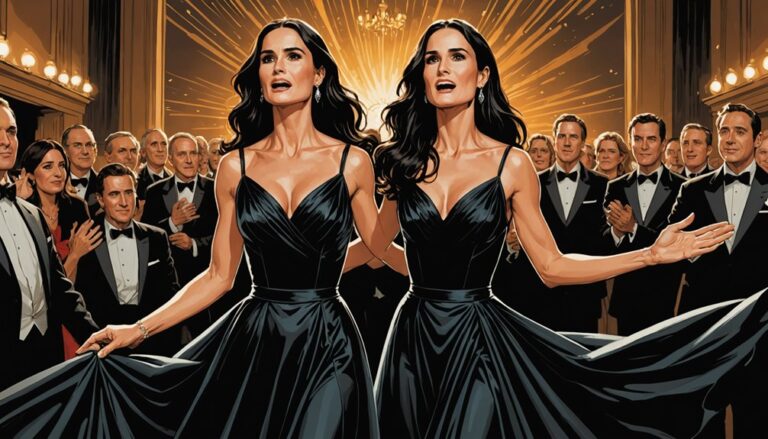Who Owns Lionsgate Entertainment
You're probably curious about the masterminds controlling the media powerhouse that's churned out blockbuster hits like The Hunger Games and Twilight – well, Lionsgate Entertainment is a publicly traded company, listed on the New York Stock Exchange under LGF.A and LGF.B. Its ownership is influenced by investor activity, with significant shares held by Liberty Global and Mark Rachesky. Founder Frank Giustra retains a strong presence on the board, supported by a diverse stake held by institutional and individual investors. But there's more to the story behind Lionsgate's billion-dollar empire, and a deeper look reveals a complex web of power players.
Company Overview and History
If you're looking for a media company with a rich history of acquisitions and growth, Lionsgate Entertainment Corporation is definitely one to contemplate.
Founded in 1997 by Frank Giustra in Vancouver, British Columbia, Canada, the company started with an initial investment of $16 million. That number quickly grew with an additional $40 million from investors.
You mightn't have guessed that Lionsgate went public through a merger with Beringer Gold Corp. and initially raked in $42.2 million in revenue, with a relatively small loss of $397,000.
The company's investment history is marked by bold moves, and its origins are certainly rooted in bold ambition. Those early investments paved the way for major acquisitions that would eventually make Lionsgate a major player in the film industry.
Corporate Structure and Ownership
Behind the scenes of Lionsgate Entertainment Corporation lies a complex web of ownership and corporate structure, shaped by years of strategic investments and acquisitions.
It's a pretty tangled mess, if you ask me. As a publicly traded company, Lionsgate's ownership trends are driven by investor influence.
Here are some key players:
- Liberty Global and Mark Rachesky hold substantial shares in the company.
- Frank Giustra, the founder, still has a significant say on the board.
- Shares are traded openly, so the shareholder structure can change based on market activity.
- Institutional and individual investors have a diverse stake in the company, thanks to its listing on the New York Stock Exchange under ticker symbols LGF.A and LGF.B.
It's a dynamic mix, for sure.
Major Acquisitions and Mergers
A key driver of Lionsgate Entertainment's growth has been its strategic acquisition and merger deals.
You've probably wondered how a company like Lionsgate became so powerful. It's all about its acquisition strategies.
In 2000, Lionsgate acquired Trimark Holdings, Inc. for approximately $50 million, marking one of its early major acquisitions.
Later, it purchased Artisan Entertainment for $220 million and Summit Entertainment for $412.5 million, greatly expanding its film library and distribution capabilities.
Lionsgate also became the parent company of Starz Inc. through a $4.4 billion acquisition in 2016.
These merger impacts have transformed Lionsgate into the media giant it's today.
Its most recent acquisition, eOne from Hasbro for $500 million in December 2023, further enhances its global entertainment offerings.
Notable Films and Television Shows
Lionsgate Entertainment's vast collection of notable films and television shows is a key factor in its position as a major player in the entertainment industry.
You've likely seen some of its most popular titles, which have left a lasting franchise impact on pop culture.
Some of its standout productions include:
- The Hunger Games and Twilight – two of the most successful film franchises of all time
- Crash, Monsters Ball, and Precious – critically acclaimed films that have received award recognition, including Academy Awards
- Mad Men and Orange is the New Black – Emmy-winning shows that have captivated audiences worldwide
Financial Performance and Market Position
You're probably curious to know how Lionsgate's financials stack up, especially after its impressive movie releases.
The company's revenue growth patterns are pretty telling – it's gone from surpassing $1 billion in revenue for the first time in 2012 to reaching a market valuation of $4.6 billion in 2024.
Now, let's take a closer look at its market valuation analysis to see what's behind this significant growth.
Revenue Growth Patterns
As Lionsgate's financial performance continues to make headlines, it's no surprise that the company's revenue growth patterns have become a focal point of interest. You might be wondering what's driving this success. Let's take a look.
- The company surpassed $1 billion in revenue in 2012, thanks to "The Hunger Games" and "Twilight Saga" franchises, showcasing the power of franchise sustainability.
- Lionsgate crossed $1 billion in both domestic and international box office revenues by 2013, with a total of $2.25 billion in 2014.
- Significant revenue growth has been attributed to the enduring popularity of franchises like "Twilight," contributing to consistent box office success.
- The Motion Picture Group generated over $1 billion at the worldwide box office in fiscal 2024, highlighting Lionsgate's continued box office success and industry relevance, solidifying its position in box office trends.
Market Valuation Analysis
With the company's financial performance consistently making headlines, it's no surprise that its market valuation has become a focal point of interest, particularly in light of its recent split with Starz.
As of May 2024, Lionsgate's market valuation stands at approximately $4.6 billion, reflecting its strong brand presence in the entertainment industry.
You've got to take into account the market trends and valuation factors at play here. The company's ability to consistently churn out blockbuster hits like The Hunger Games and Twilight Saga has certainly contributed to its market strength.
The Motion Picture Group's $1 billion box office revenue in fiscal 2024 is a proof of this.
You've got to give it to Lionsgate – its content strategy is clearly working, and investors are taking notice.
Leadership and Board of Directors
You're probably curious about who's calling the shots at Lionsgate, and the answer is Jon Feltheimer, the company's CEO since March 2000.
As you take a closer look at the leadership structure, you'll notice some familiar names, including Michael Burns, Vice Chair since March 2000, and Mark Rachesky, the founder of MHR Fund Management, who's been a director since September 2009.
But what really stands out is the diversity of the board, with members like Mignon Clyburn, who's passionate about bridging the digital divide and promoting media diversity.
Key Executive Members
You're probably curious about the people who run the show at Lionsgate. Let's explore the key executive members and their impressive backgrounds.
The leadership dynamics at Lionsgate are quite intriguing, with some heavy hitters at the helm.
- Michael Burns brings a wealth of experience as Vice Chair, guiding the company's strategic direction since 2000.
- Jon Feltheimer, CEO since 2000, boasts an impressive track record from his time at Sony Pictures.
- Mignon Clyburn adds a unique perspective as a director, focusing on media diversity and the digital divide.
- Dr. Mark Rachesky, Chair of the Board since 2009, has been instrumental in shaping Lionsgate's corporate governance and strategic initiatives.
It's clear that these key executives wield significant executive influence, shaping the company's vision and direction.
Leadership Structure Evolution
Over the years, Lionsgate's leadership structure has undergone significant evolution, reflecting the company's growth and strategic shifts.
You've likely noticed some big leadership changes – like the additions of Daryl Simm and Hardwick Simmons to the board of directors. These moves show Lionsgate's focus on enhancing corporate governance and strategic advisory capabilities.
It's no secret that companies like Lionsgate face tough governance challenges, from steering through complex regulatory environments to making tough strategic decisions.
But with a diverse board featuring experts like Mignon Clyburn and Gordon Crawford, Lionsgate seems well-equipped to tackle these challenges head-on.
And with Mark Rachesky at the helm as Chair of the Board, you can bet Lionsgate's strategic initiatives are in good hands.
Board Committee Composition
A closer look at Lionsgate's Board Committee Composition reveals a deliberate structure designed to leverage the diverse expertise of its leadership and board of directors.
You can't deny that the company's focus on board diversity is on point, with members like Dr. Mark Rachesky and Mignon Clyburn bringing their A-game to the table.
But what really sets them apart is their committee effectiveness.
Here's a breakdown of their key committees:
- The Audit and Risk Committee, chaired by Hardwick Simmons, is all about ensuring compliance and financial integrity.
- Daryl Simm heads up the Compensation Committee, overseeing executive compensation and performance metrics.
- The Nominating and Governance Committee focuses on identifying new board members and shaping the company's governance structure.
- The Strategic Planning Committee drives the company's long-term strategy and growth initiatives.
Growth and Expansion Strategies
Lionsgate's growth through strategic expansion has been a defining feature of the company's business model, enabling it to stay competitive in the ever-evolving entertainment industry. As you explore deeper, you'll notice that content diversification and international collaboration have been key drivers of this growth.
| Expansion Strategy | Resulting Outcome |
|---|---|
| Acquisition of eOne from Hasbro | Enhanced content offerings and global presence |
| Launch of Lionsgate Premiere | Targeted theatrical and digital releases catering to consumer preferences |
| Establishment of Lionsgate Interactive Ventures | Multiplatform video game development based on popular film franchises |
| Formation of GlobalGate Entertainment | Collaboration on local-language films, enhancing international footprint |
| Strategic film production (10-15 theatrical, 40-50 multi-platform titles) | Diversified revenue streams leveraging an extensive film library |
Business Operations and Divisions
Multiple divisions drive Lionsgate's business operations, with the Lionsgate Motion Picture Group playing a key role in releasing a mix of 10-15 theatrical films and 40-50 multi-platform titles every year.
You might be wondering, what else does Lionsgate have up its sleeve?
- It owns a massive film and television library with over 20,000 titles, making it one of the largest in the industry.
- Lionsgate Interactive Ventures develops multiplatform video games based on its franchises, expanding its content offerings beyond traditional media.
- The company's strategic acquisitions, like eOne and Summit Entertainment, have enhanced its scripted and unscripted television capabilities and diversified its content portfolio.
Lionsgate's business operations are all about content diversification and media adaptations, and it's clear they're not slowing down anytime soon.
Final Thoughts
You're probably wondering what's next for Lionsgate Entertainment. With its impressive film and TV lineup, it's no surprise the company's been making waves in the industry. But, let's be real, its financial performance has been a bit of a rollercoaster ride. Still, with its recent growth and expansion strategies, Lionsgate's future is looking brighter than ever. Will it continue to produce hits like "The Hunger Games" and "John Wick"? Only time will tell, but we can't wait to find out.







